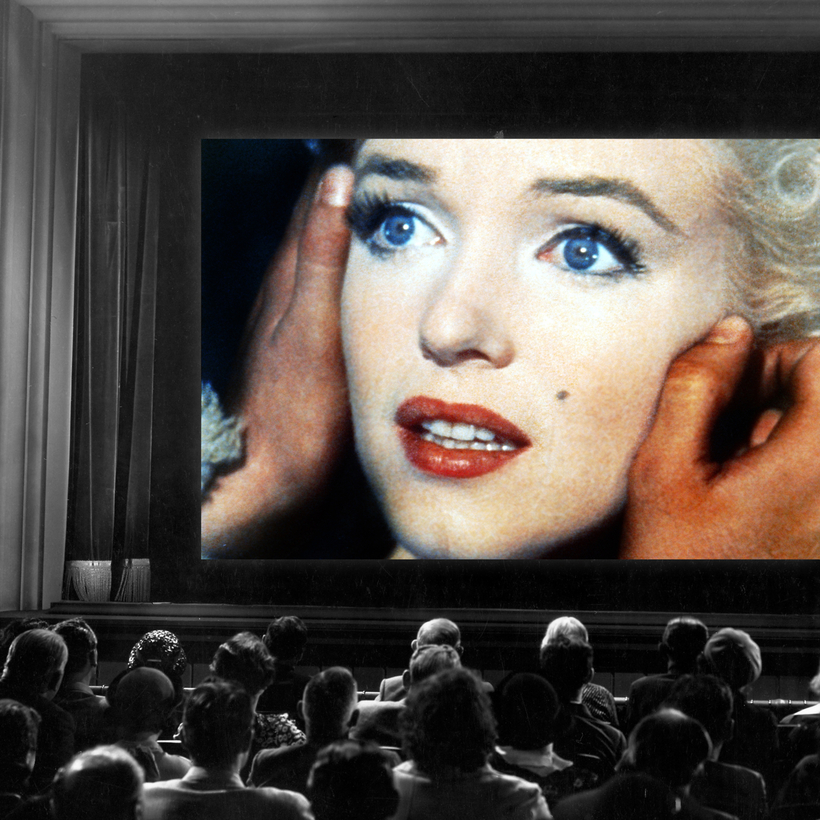Marilyn Monroe began as a promise — a shimmering, golden guarantee that all would be well. In postwar America she became a goddess because she embodied the country’s new philosophy: no matter how ghastly or difficult your life was, you could simply put on a touch of lipstick.
There are “these girls who try to be me”, she giggled in her final interview. “But, gee, they haven’t got it.”
She was right — no one else had.
Whatever “it” was, though, “it” has never been less in evidence than in a new film about her life.
Blonde is a shocking, ugly, traitorous movie — nearly three hours of shrieking abuse. Why did I watch it? Especially when I could have watched any number of joyful, glossy movies with Marilyn in them? Not that they’re on the miserly Netflix, which is streaming Blonde.
The film is a travesty, starring a woman who only vaguely looks (or sounds) like Marilyn — the Cuban actress Ana de Armas. As in any Halloween stabfest, this little hottie is raped, drugged, beaten and finally, essentially, killed. It offers no explanation of why Monroe was so successful; instead it tells us only why she failed.
She was weak, it says, unable to assert herself over studio bosses, who raped her in return for roles. She was beaten and abused by awful lovers, among them the possessive athlete Joe DiMaggio. She is shown as so without agency or even a remote sense of herself that in a scene shortly before her death in 1962 she allows herself to be dragged from an aircraft and delivered to a hotel room, where she is coerced into giving oral pleasure to a semi-naked, pig-like JFK. She passes out, wakes up, vomits and is dragged away again.

Each generation gets the Marilyn it deserves — so why do we get this one?
I’ve already written about the nihilism of the present culture and the dearth of creative thought. On the one hand we have the blandest pap imaginable — superhero movies and Adele — and on the other we have Netflix and its mindless death porn.
Blonde is a shocking, ugly, traitorous movie — nearly three hours of shrieking abuse.
Why do we consider this sort of film progress? It feels, actually, as if we’re going backwards. The playful cheesecake Marilyn of the 1950s — a confected blonde bimbo that this film clearly despises — seems infinitely preferable to the Marilyn of 70 years later: a haggard, weeping cipher and shivering perma-victim who is obsessed with the contents of her womb.
In an attempt to “explain” Marilyn, the makers have simply created another pathetic object: a woman who spends the entire film either naked or in tears, or both. She cries over her rapes and (graphic) abortions, but also over soft toys, and falls screaming, flat on her face, when required to give friends food at a party. She isn’t a functional human being, let alone a successful film star.
The script is full of deranged one-liners: “Time is like a fast river running through us.” “I wanna live in Chekhov.” She calls almost all her lovers “Daddy”. She can barely touch a drink without getting wasted; barely get in a car without crashing it.
We’re told the film is based on a novel from 2000 by Joyce Carol Oates, but that is a fig leaf. Where Oates (kind of) took Monroe seriously, the director of this film does whatever he wants with her, just like the many studio bosses, directors, politicians and rich boys before him.
Only once does she assert herself, when she finds out Jane Russell is being paid 20 times as much as she is, “and I’m playing the blonde in Gentlemen Prefer Blondes”, she shrieks. But then it goes straight back to disapproving of her and the leering men in Hollywood surrounding her, while also, somehow, being one of those men, letting the camera linger over her bottom as she stands over the subway vent, or explicitly recreating a grim threesome. It portrays none of her passion, her self-sufficiency, her pride that she was “never kept … I was always my own”. As one character puts it: “Marilyn deserves better than this.”
Is this where victim culture has led us — to films in which previously spirited and complex women have been boiled back down into blank dolls? Princess Diana, Grace of Monaco and now Marilyn, all repackaged as dreary victims to drive sales.
It says everything about our collective opinion of women that Netflix thinks the best and most commercial portrait of a notably gorgeous woman is to make her sad and ugly.
Women are now most easily marketed as failures. Schoolgirls are told that they ought to be crippled by their periods. Female celebrities scramble to be defined by menopause, the horrors of pregnancy or, even better, miscarriage. On podcasts, in interviews and in articles otherwise intelligent, capable women moan about their lives collapsing, or being unable to cope with even the tiniest sliver of adversity: they are all like Marilyn on a date with DiMaggio at a perfectly nice restaurant: “I’m afraid of some of the people here.” Marilyn had more power when she was a plain sex object, giggling on the cover of Playboy.
People have described the film as “disgusting” and “unwatchable”, but they’re still drinking it all in. It got a 14-minute standing ovation at Venice and is top of the charts on the streamer, along with a show about the corpse-shagging gay serial killer Jeffrey Dahmer.
Camilla Long is a columnist for The Times of London and The Sunday Times. She was named interviewer of the year at the British Press Awards in 2010 and 2016

